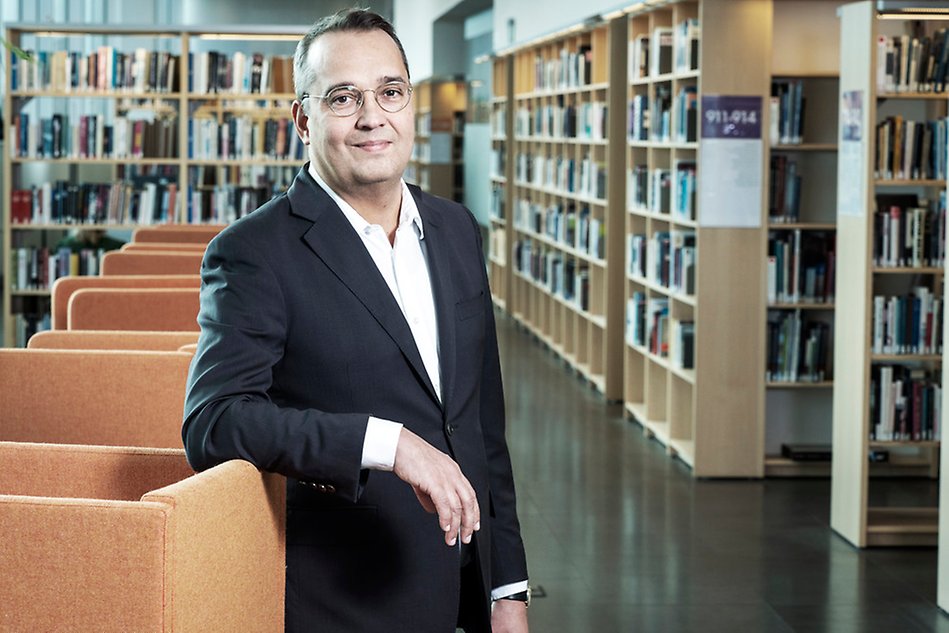Professor’s portrait: Researching the borderland between law, technology, and values
The law says one thing. The average person may have a different opinion. Throw a smartphone or other technology into the mix, and it gets even more exciting. Måns Svensson is a new Professor of Sociology of Law at Halmstad University and deals with such diverse issues as traffic standards, threats against journalists, and people’s personal finances in challenging times.
“New technology brings lots of new standards. Our laws are not adapted to the conditions of the new technology and that creates conflict and tensions in society.”
Måns Svensson, Professor of Sociology of Law

Måns Svensson is interested in history and therefore prefers to practise his sailing interest in old wooden boats that he has first renovated. Renting passage on schooners is another way to go on adventures. A couple of years ago, he and his then 75-year-old father were part of the crew on a voyage to Uruguay. He describes himself as a curious person who likes challenges.
Ever since Måns Svensson, now Professor of Sociology of Law and Dean, was a doctoral student, he has been interested in understanding more about technology in relation to social and legal norms.
“It is very exciting to examine technology based on normative forces,” he says.
What role can technology play in the democratic conversation? One of Måns Svensson’s ongoing research projects is highly topical, a study he leads on the development of threats and hate against journalists in Sweden, especially on social media, and how this can lead to a shift in opinion and erosion of democracy and the rule of law.
“Over the past three years, forty per cent of journalists have not reported, and almost half have adapted how they report on various topics to avoid online harassment,” says Måns Svensson, who presented the study at the International Crime Victim Day 2021.
Threats and hate against journalists – a sociology of law perspective on crime victims
Digitalisation, with social media, e-mail, and other platforms, for example, allows more people to speak and share knowledge, opinions and feelings, both easily and quickly. Getting to speak up is something very positive - the downside, however, may be that it is also easy and quick to share biased and ill-considered things. It can even be about pure lies, hate and threats. One group that is a target of such statements is journalists. “Naturally, this has consequences for the individual, including their working environment. What is less explored are the societal consequences, according to Måns Svensson, project manager.
Survey interviews with 3,000 journalists (in collaboration with the Swedish Union of Journalists) active in Sweden, where they reflect on their experiences over the past three years, show grim statistics. Forty per cent have not reported and almost half of them have adapted how they report to avoid online harassment.
Journalists who have experienced threats and hate of such magnitude that they believe it has negatively affected their health report almost twice as much self-censorship.
Men and women experience the negative impact on health equally. On the other hand, younger journalists feel that their health is negatively affected to a greater extent, as do journalists with a foreign background.
Low confidence in the justice system in the matter
The study also shows that journalists’ perceived confidence in the judiciary on this issue is quite low. More than half of the journalists believe the judiciary has a very poor, or rather poor, ability to protect their interests as crime victims.
Most threats and hate occur in connection with reporting on immigration and integration, followed by racism and discrimination, closely followed by crime and criminality, then equal opportunity issues and then politics.
“Self-censorship can lead to a cognitive dissonance,” says Måns Svensson.
“This cognitive dissonance creates shifts of opinion and changes in public opinion formations. People have a hard time with mixed signals. If, for example, you have the opinion that immigration is positive for Sweden and know that if you portray such positive aspects, you can get extremely negative reactions. This leads to self-censorship. If you then have a conflicting behaviour, where what you think and how you then act is contradictory, it is painful for people. This means you can reconstruct your opinions in the long run and shift the opinions so that they are more in line with what you are doing when reporting.”
Will study posts on Twitter
The next step in the study is to study the content of 2,000 journalists’ posts on Twitter. The collection and analysis of data is done in collaboration with computer linguists at Språkbanken at Gothenburg University. The study is about understanding emotions online - when does communication become aggression?
Behind the research project, which is funded by the Swedish Crime Victim Authority, are Måns Svensson, Professor of Sociology of Law, Halmstad University, Oscar Björkenfeldt, PhD student in Sociology of Law, Lund University, and Karl Dahlstrand, Ph.D. in Sociology of Law, Lund University.
Måns Svensson presented the study at the International Crime Victim Day 2021.

The relationship between law and society is the core of sociology of law. An individual who is considering whether to comply with a law, or a politician who is considering whether the law to be enacted will really be complied with – they are thinking from a sociology of law perspective. In addition to social interaction and the scope of the law there is, for example, digitalisation.
Måns Svensson applied to Halmstad University to become dean of the School of Education, Humanities, and Social Sciences. In January, he was also appointed Professor of Sociology of Law. The path to Sociology of Law went from upper secondary school in Halmstad via Madrid to legal studies in Lund and an elective term of courses in sociology of law.
“I realised that this is where you ask all the interesting questions about the law,” he says with a small smile.
Rapid technological changes in society
After first and second cycle education, he went on to third-cycle education. Måns Svensson wrote a dissertation on social norms and compliance: what do the norms look like? How can they be changed to increase security? His case study was about seat belts, sobriety, and speed in traffic, and while it was not really the main focus from the beginning, traffic issues have become a companion over the years.
“How shall society act to ensure compliance with laws, for example in relation to road safety? When cars become increasingly autonomous and drive themselves, who is truly responsible when a car accident occurs? says Måns Svensson.
During rapid technological changes, something happens in society, and Måns Svensson is interested in this from a sociology of law perspective:
“New technology brings lots of new standards. Our laws are not adapted to the conditions of the new technology and that creates conflict and tensions in society.”
Air traffic control is another example. What does it mean for air traffic controllers who guide pilots during landing from the tower when various automation processes have become the air traffic controllers’ ”colleagues”?
“If there is an accident, who is to blame in a situation where the pilots have also used the autopilot? It is an ethical dilemma to only talk about human guilt when technology plays such a big part. The court wants a human to be held accountable, says Måns Svensson and continues:
“This is one reason why I applied to Halmstad University: the fine ongoing research in AI, technology, and innovation. I am interested from a social science perspective and want to show how social sciences have a very important role to play in understanding technology. There is a need to teach automated decision-making processes, such as AI, to break rules. How do you do that without it becoming regulatory?”

Måns Svensson’s dissertation was about social norms and compliance with traffic as a case study.
“You must make systems capable of making deeper ethical reflections, i.e., to go deeper than the more instrumental rules that are often set up for the technology itself. That is what humans do - a human who cannot reflect based on empathy and social considerations, but only based on rules, will not be a good decision-maker. One example is public authorities that allow ”smart” algorithms to handle decisions on the payment of various forms of financial support. Without elements of empathy and ethical reflections in such decisions, you risk missing the mark. Technology that follows the law without reflection does not really understand the complicated nature of law in practice.”
Standards are developed in parallel
The relationship between law and society is the core of sociology of law. But what if the law becomes an obstacle to innovation? Måns Svensson has studied copyright in relation to the internet. The web makes it possible to share music, movies, images etc. for free. The starting point of the legislation is that this is often illegal. When the question was most topical, there was talk of an entire generation of young people about to be criminalised in the hunt for illegal file sharing.
“Social norms develop alongside technical norms. People generally do not think it is wrong to download movies from the web, even if it is not okay from a copyright perspective. We shrug our shoulders and say, ‘is it really safe, don’t you get caught?’ but there is generally no social condemnation of such behaviour.”

Researchers talk about path dependence, where the law was designed during a time when reality was different. From a research perspective, it will be very exciting, says Måns Svensson, to study the standardisation processes that arise in the wake of new technology - where the often disruptive nature of innovations collides with law, which is responsible for maintaining historical structures.
Social and economic security is another area that Måns Svensson looks at through the lens of sociology of law. In collaboration with the Swedish Enforcement Authority, he and his colleagues at Lund University have taken an interest in people’s personal finances.
“We are investigating the relationship to the pandemic and we are interested in understanding how household indebtedness has developed during the pandemic. The pandemic has affected people disproportionately. The situation for people with financial difficulties has become even more uncertain, while more affluent households are faring better during the pandemic. However, everyone’s buffer decreases somewhat, and people’s financial margins generally shrink.”
Social innovations
Social innovations are one of Måns Svensson’s many research interests. He is a co-founder of a company that has designed school computers for children in impoverished areas in India and Myanmar to work with standards on compliance with the Convention on the Rights of the Child in the classroom.
“It is an example of how to use norm theory as part of technical design to achieve values regarding the rights of children.”
During the so-called Arab Spring in the early 2010s, Måns Svensson, in collaboration with the Swedish Institute, trained students who were active in the democracy movements in the field of ”social innovation in a digital context”. In an ongoing project in Uzbekistan and Vietnam, he works with corruption issues, including in relation to children’s right to schooling. One aspect is about using technology to avoid direct contact between people in different power situations, where bribes in everyday life can be demanded by principals, teachers, midwives and so on.
Becoming a professor is a recognition.
“I am of course happy to be a professor and take it as a signal that my academic work, both in terms of research and teaching, is at a reasonably good level. At the same time, perhaps one should not place too much emphasis on academic titles.”
Working environment and collaboration of interest
Måns Svensson feels he has benefited from frequently being able to work on various dream projects. Collaboration on a broad front is part of this, and therefore it took him a relatively long time to complete the third-cycle education. There was so much else going on at the same time! Among other things, he was involved in building up the Centre for Work Environment and Leadership at Lund University and he worked on various public inquiries during his doctoral studies. After his defence of his doctoral thesis, he was involved in building interdisciplinary centre formations and he has, as CEO of an innovation company affiliated with LU Holding, been involved in developing a school computer for developing countries together with telecom giant Ericsson.
He views security and well-being – a good working environment – as the best breeding ground for creativity and production quality, not least within research.
“Everything I have done; I have done together with others. Really good research is achieved when you have a group that loves and is passionate about solving common tasks. I believe you must be curious as a researcher. If you are curious, you open doors and look to see what’s inside.”
One such door is Halmstad University. There was nothing that ‘pushed’ him away from Lund University, but the draw to do something new and get to know a new environment was strong.
“Halmstad University’s profile is very exciting. Also, I grew up in Halland. I spent much of my youth in Halmstad and have many friends here. It’s nice to return.”
Text: Kristina Rörstöm
Picture: Anders Roos, iStock
About Måns Svensson
Måns Svensson was born in 1969 and grew up in Hylte municipality. In upper secondary school, he studied natural sciences in Halmstad, and he became a reserve officer in 1992. He studied for a Bachelor of Science in Sociology of Law at Lund University and then went on to third-cycle education. In 2008, he defended his dissertation ”Social norms and compliance” and in the same year, he was hired as a university lecturer at the Sociology of Law Department at Lund University. He became an Associate Professor of Sociology of Law in 2013. In 2015, he became responsible for external research funding, and from 2020 responsible for the third-cycle education, at the Sociology of Law Department. Måns Svensson was a driving force for and one of the co-founders of the Centre for Work Environment and Leadership at Lund University, where he was also director. In 2013–2017, he was director of WTS - Centre for Work, Technology and Social Change - and 2017–2020 director of the Research Institute for Economic Security at Lund University. He was involved in establishing the national research network FALF (Swedish Association for Working Life Research). Until 2020, he was chair of the preparatory group labour organisation at FORTE (Swedish Research Council for Health, Working Life, and Welfare). In January 2021, he became Dean of the School of Education, Humanities and Social Sciences at Halmstad University, and was appointed Professor of Sociology of Law at the University.

